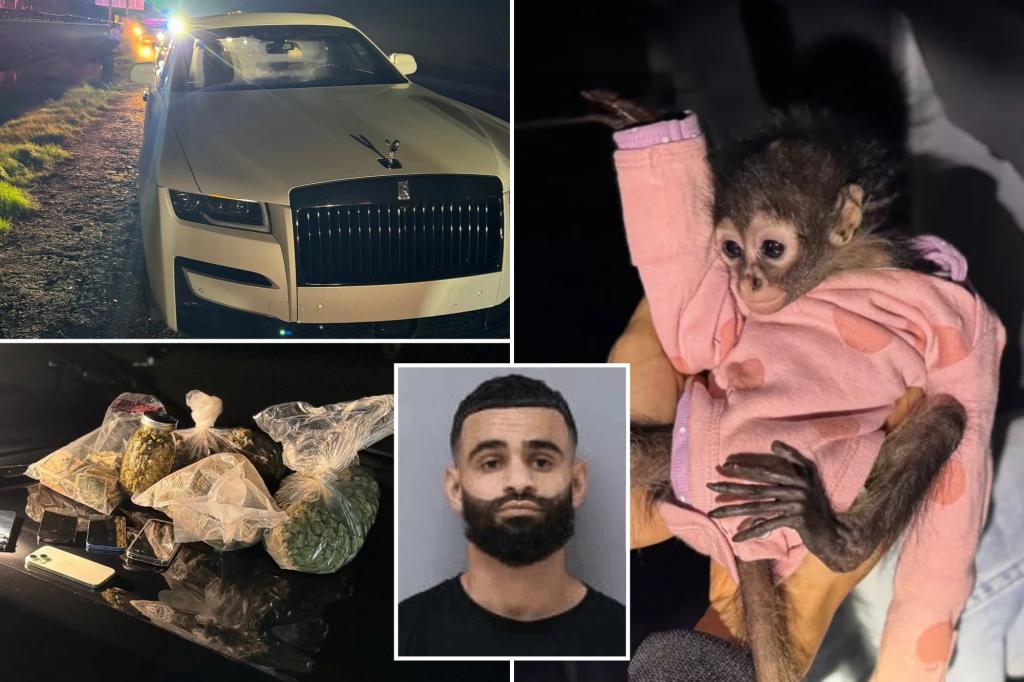An Unusual Traffic Stop: A Rolls Royce, Marijuana, and a Spider Monkey
On a seemingly ordinary Monday night in California, a routine traffic stop for speeding quickly escalated into a peculiar encounter for highway patrol officers. Ali Mused Adel Mohamed, 27, was driving a 2022 Rolls Royce Ghost when he was pulled over on State Route 99. Inside the luxury vehicle, officers discovered not only a substantial amount of cannabis suggesting intent to distribute, but also a surprising passenger: a one-month-old spider monkey clad in a pink onesie. The presence of the exotic primate, clinging to Mohamed, added an unexpected layer of complexity to the traffic stop, immediately raising questions about its legal status and well-being. This bizarre combination of luxury, illegal substances, and an endangered animal created a captivating narrative that quickly gained attention.
Legal Ramifications and the Fate of the Monkey
Mohamed’s arrest and subsequent charges encompassed both driving under the influence (DUI) and possession of cannabis for sale. However, the presence of the spider monkey introduced another legal dimension. Owning primates as pets is prohibited in California, and spider monkeys, in particular, are classified as an endangered species. This legal restriction meant that the infant primate, later revealed to be male, would be removed from Mohamed’s custody. The Madera County Animal Services, the initial custodians of the monkey, recognized the specialized needs of the animal and the importance of its eventual placement in a suitable environment.
Temporary Care and Public Interest
While at the Madera Animal Shelter, the unnamed monkey received interim care, capturing the hearts of many with its endearing feeding habits. A video posted on Facebook showcased the tiny primate skillfully using two spoons to consume mushed bananas. This charming footage humanized the situation, highlighting the vulnerability of the young monkey caught in unusual circumstances. The video also underscored the temporary nature of the shelter’s role and the need for a more appropriate long-term solution. The story resonated with the public, sparking discussions about exotic pet ownership and the importance of wildlife conservation.
Transfer to Oakland Zoo and Ongoing Investigation
The California Department of Fish and Wildlife subsequently took custody of the monkey and arranged for its transport to the Oakland Zoo, a facility better equipped to provide the specialized care the primate requires. This transfer marked a significant step in ensuring the monkey’s long-term welfare. Meanwhile, the legal proceedings against Mohamed continued, with the added charge of possession of an exotic animal. Images from the arrest scene, showcasing the monkey nestled in Mohamed’s lap within the patrol car and later the handcuffed driver, provided a stark visual representation of the events. The discovery of marijuana, multiple phones, and cash inside the Rolls Royce further contributed to the narrative of potential criminal activity.
Parallels and Contrasts: Another Monkey’s Tale
This incident resonated with a similar occurrence involving another spider monkey, Jorgie Boy, in Dallas, Texas. Jorgie Boy, an internet-famous primate, was confiscated by authorities following a car crash where his owner, Brandi Botello, was found driving under the influence. Jorgie Boy’s condition – fractured bones and severe malnutrition – highlighted the potential risks of private ownership of exotic animals. While both cases involved spider monkeys and intoxicated owners, the circumstances and outcomes differed significantly. Jorgie Boy’s owner fought for his return, while the California case saw swift action to relocate the monkey to a professional care facility, reflecting a differing approach to enforcing regulations related to exotic pet ownership.
Wider Implications: Exotic Pet Ownership and Conservation
These incidents, though distinct in their details, highlight the complex issue of exotic pet ownership and its intersection with animal welfare and conservation efforts. They raise questions about responsible pet ownership, the ethics of keeping endangered species in private hands, and the need for stricter enforcement of existing regulations. The contrasting outcomes of the two cases further underscore the lack of uniformity in handling such situations across different jurisdictions. The stories of these monkeys serve as poignant reminders of the importance of safeguarding endangered species and understanding the impact of human actions on vulnerable populations. The public attention generated by these cases has the potential to raise awareness and promote dialogue on responsible pet ownership and wildlife conservation, ultimately fostering a more informed and compassionate approach to animal welfare.











